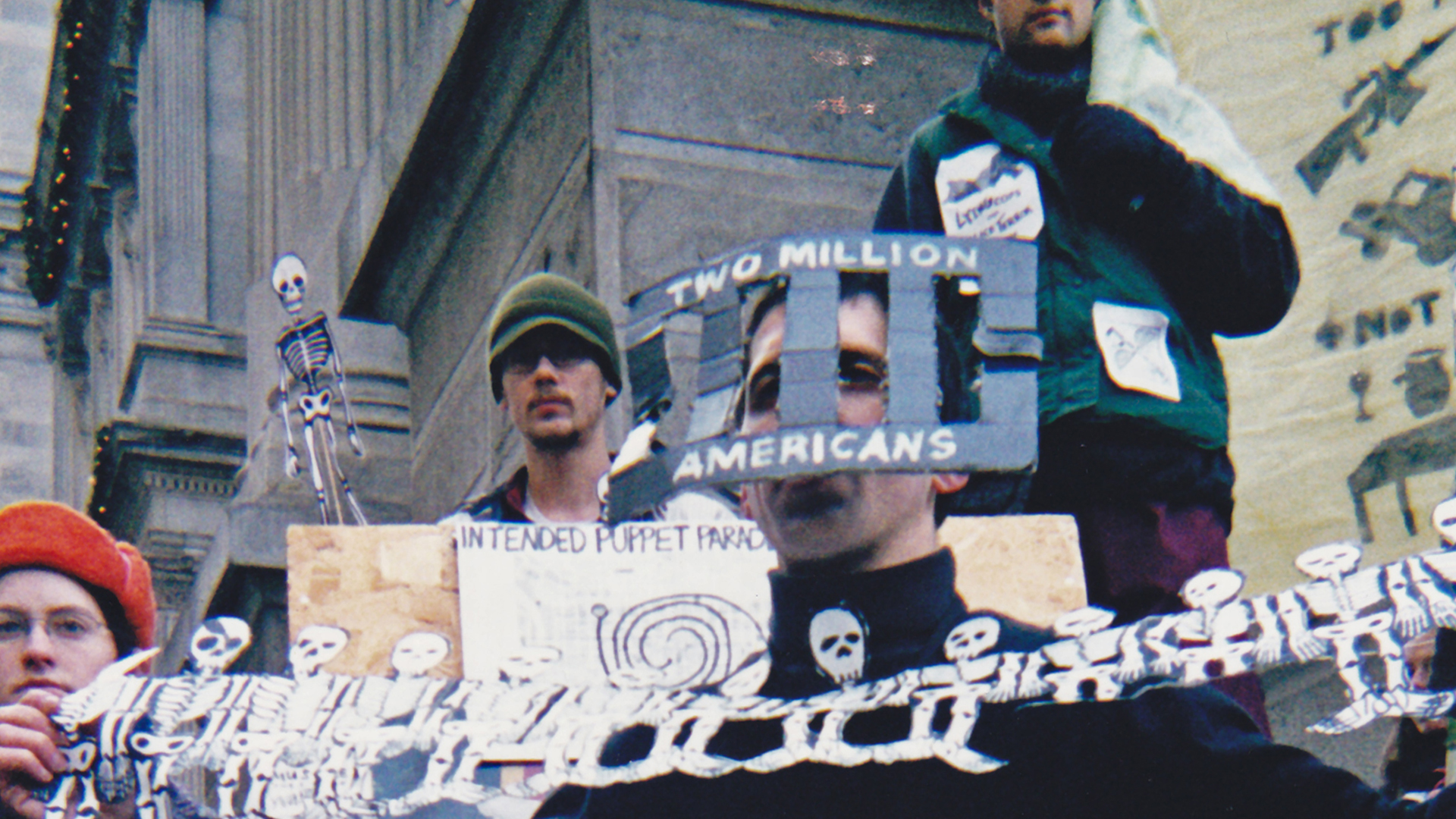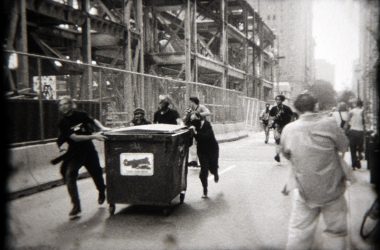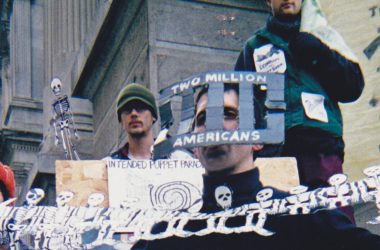
The Ninth Circuit heard oral arguments last Friday in Panagacos v. Towery, the most important case of the US military spying on political activists in decades.
The lawsuit brought by seven activists in 2010 challenges a sweeping surveillance and infiltration apparatus involving the Army and other divisions of the military, and local and state law enforcement. The apparatus relied largely, but not exclusively, on Army intelligence analyst John J. Towery (under the alias “John Jacob”).
Claiming to be an anarchist, Towery infiltrated several political groups in the mid-to-late 2000s with the primary aim of gathering intelligence on antiwar activists planning peaceful blockades of military shipments in and out of the Ports of Olympia and Tacoma. Towery fed protest plans and other information to local police who used that information to preemptively arrest activists on their way to demonstrations, and to generally harass them and frustrate their objectives.
Towery’s information was also used to build Domestic Terrorist dossiers on nonviolent political activists, including two Panagacos plaintiffs. Those dossiers, full of false and misleading information, were distributed to numerous law enforcement agencies in the Pacific Northwest in an effort to target the activists. The Army has even admitted to this.
Notably, Towery admitted to eavesdropping on an attorney-client privileged listserv and feeding information to a prosecutor who, in turn, used it to cause a mistrial in a state criminal case that activists were winning.
All of these points and more were deftly raised Friday by Panagacos lead attorney Larry Hildes, who is also a member of the National Lawyers Guild (along with others on the legal team).
Oral Arguments
The three-judge panel (all Clinton appointees), including Judge William A. Fletcher, Judge Ronald Gould, and visiting Judge Frederic Block, heard oral arguments on whether they should overturn the lower court’s 2014 dismissal of the Panagacos case.
The first question was asked by Judge Fletcher who wanted to know the worst example Hildes could offer on how the plaintiffs were harmed by Towery and the actions of law enforcement.
The number of ways that Towery and the Army broke the law and violated the rights of protesters is so numerous as to be systematic. As Hildes put it in court, on the whole, the Army in cooperation with local and state law enforcement “chipped away” at the antiwar activists with the explicit goal of incapacitation and chilling free speech.
How do you draw just one example? Hildes offered a few.
“By explaining that the Army and local police engaged in systematic and pervasive attacks on political activists, we hopefully convinced the panel to view the attacks as a military operation carried out against peaceful dissidents,” said Hildes after the arguments.
Judge Gould asked whether the military had a legitimate interest in addressing the protests (nonviolent civil disobedient blockades).
Hildes quickly responded that the military has no enforcement interest in violating the rights of protesters and certainly doesn’t justify infiltrating birthday parties and teaching activists how to shoot automatic weapons.
Judge Block then asked if the Posse Comitatus Act (PCA) provided a civil right of action (could the plaintiffs sue based on a violation of the PCA).
Hildes rightly said the PCA has no civil right of action (it’s actually a federal criminal statute enforced by the US Attorney General or Department of Justice), but that the Panagacos lawsuit relies on numerous constitutional violations committed by the defendants. Invoking the PCA, however, further illustrates the contempt the military has for free speech, as well as the lengths it’s willing to go and the laws it’s willing to break to achieve its objectives.
Judge Block also raised the question of whether the military was entitled to Qualified Immunity, protecting it from legal challenge.
Hildes told the court that there’s nothing that protects the military for engaging in this kind of conduct, and he said there’s plenty of case law to back that up.
The Defense
Three attorneys argued for defendants Towery, his Army supervisor Thomas Rudd, and the City of Olympia. Towery’s attorney Tom Brennan went first.
The takeaway from Brennan’s 6-minute argument was that he repeatedly failed to answer Judge Fletcher’s questions, resulting in strained interactions between the two.
Brennan did manage to get across to the court his position that Towery may have passed information on to local law enforcement but that information did not inform or influence local law enforcement’s actions. This would be a recurring theme for the defense.
Rudd’s attorney Theo Angelis went next and claimed that no evidence exists to tie Rudd to any of the First and Fourth Amendment claims. Angelis shrugged off email communication from Rudd that seems to indicate otherwise.
Next was the City of Olympia’s attorney John Justice who basically parroted the claim that there is no evidence that intelligence passed from Towery and the Army to local law enforcement had any influence on their actions.
Shifting the Narrative
In addition to responding poorly to questions, giving a weak delivery of the arguments, and proffering unreasonable positions, the defense has noticeably shifted its narrative.
For years, the defense claimed that Towery didn’t really work for the Army and, therefore, he and the military could not be implicated in the spying apparatus. That is, until discovery and public records obtained in 2014 revealed that, indeed, Towery did work for the Army, and forced Towery and Rudd to admit it in depositions.
The fact that Towery, Rudd and others lied about Towery’s role and misled a 2009 Army investigation into the matter hasn’t really been addressed, because shortly after these revelations US District Court Judge Ronald B. Leighton dismissed the Panagacos lawsuit on a summary judgment motion.
Now, the defense narrative and strategy appears to be based on denying any link between intelligence gathered by Towery and the actions of law enforcement. The same people who built a spying apparatus and used it to disrupt and dismantle a nonviolent antiwar movement want the court and public to suspend disbelief long enough to sever the link between cause and effect.
According to the defense, local law enforcement (which, by the way, is getting thrown under the bus by fellow defendants who deny complicity in constitutional violations) apparently didn’t need or use Towery’s intelligence in order to harass and wrongfully arrest activists.
But, evidence of collaboration between law enforcement and the military, directly implicating Towery and his Army supervisors, says otherwise.
Still Seeking Justice
The plaintiffs filed their lawsuit seven years ago. The Panagacos case has reached the Ninth Circuit twice and still isn’t anywhere close to trial. On the latest appeal, plaintiffs have waited nearly two years to argue that Judge Leighton’s dismissal should be overturned, and a ruling could still be weeks or months away.
But, because the Panagacos plaintiffs and their attorneys are persistent and determined, they continue to fight.
“By targeting activists without probable cause, based on their ideology and the perceived political threat they represent, the Army clearly broke the law and must be held accountable,” declared Hildes.




